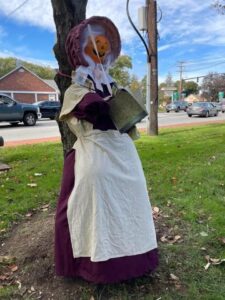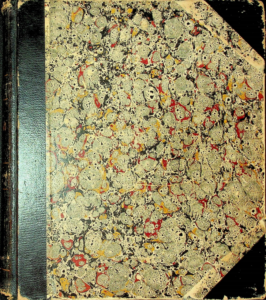Nov 1, 2023
 October in Medfield – it’s a magical feeling, somehow comforting and spooky at the same time. This week, my thoughts turn to our own Hannah Adams (1755-1831). I think she would have enjoyed being a contestant in the town’s Scarecrow Spooktacular contest, for it seems that she had a personal connection with the spirit realm. This is, of course, in addition to being the first American woman to earn a living as a writer. Adams’ primary works are “A View of Religions”, in which she explicitly intended to let the religions speak for themselves without injecting her own opinion – a very unusual approach in 1784 – and “A Summary History of New-England” (1799), which took such a toll on her eyesight that she was forced to hire someone to transcribe the manuscript.
October in Medfield – it’s a magical feeling, somehow comforting and spooky at the same time. This week, my thoughts turn to our own Hannah Adams (1755-1831). I think she would have enjoyed being a contestant in the town’s Scarecrow Spooktacular contest, for it seems that she had a personal connection with the spirit realm. This is, of course, in addition to being the first American woman to earn a living as a writer. Adams’ primary works are “A View of Religions”, in which she explicitly intended to let the religions speak for themselves without injecting her own opinion – a very unusual approach in 1784 – and “A Summary History of New-England” (1799), which took such a toll on her eyesight that she was forced to hire someone to transcribe the manuscript.
Anyway, the other day I was combing through the dusty volumes in the basement of the Historical Society, when I had the distinct feeling that some long-departed Medfield writer was waiting to speak to me. Suddenly I shivered, though it must have been 80 degrees down there, for there she was: Miss Hannah Adams, speaking to me through the journal of Miss Mary Morse, in one of those elegantly marbled notebooks with the modest title “Items and Facts Connected to the Early History of Medfield and Medfield Families of the Early Times Which Are Not Accessible in Any Published History of the Town, Collected by Miss Mary Morse, July 3, 1877.” Through Miss Morse’s journal I was able to discover a fascinating side to the Hannah Adams we all thought we knew.
Miss Morse begins by sharing that Miss Adams “was more eccentric than her father (Thomas Adams).” However, her eccentricities seemed fairly ordinary to me: like her father, she was a bookworm; she brought her knitting to school, for which she was reprimanded by the teacher; and somewhat later, she developed what sounds like a celebrity-type crush on a visiting preacher, William Hill of Liverpool, who in 1798 preached in Wrentham. All of Medfield turned out to hear Mr. Hill. Hannah Adams described Hill as “the English beauty” in whom “both in person and mind are united every perfection that delights the eye.” Just as I was about to conclude that Miss Adams was, after all, an intelligent woman of healthy appetites who enjoyed the textile arts, I came upon an arresting passage that might indeed be counted as eccentric.
 Miss Morse continued, “if Miss Adams was visiting in any house and left the room, she could never find her way back. If there were two families in one house, she would always go into the wrong family. At one time, she came (back to Medfield) from (her home in) Boston, to visit her brother, John Wickliffe Adams. She (went) upstairs to see his mother, her stepmother.” After some time had passed, Miss Adams was found sitting on the cellar stairs. “She had, no doubt, forgotten where she was going,” says Miss Morse.
Miss Morse continued, “if Miss Adams was visiting in any house and left the room, she could never find her way back. If there were two families in one house, she would always go into the wrong family. At one time, she came (back to Medfield) from (her home in) Boston, to visit her brother, John Wickliffe Adams. She (went) upstairs to see his mother, her stepmother.” After some time had passed, Miss Adams was found sitting on the cellar stairs. “She had, no doubt, forgotten where she was going,” says Miss Morse.
What happened to Hannah Adams during this short lapse of time? Did she actually forget where she was going, or were other forces at play? Miss Morse finally reveals a possible explanation, which in turn reveals more questions, unlikely ever to be answered.
We know that Hannah’s mother died when she was very young, leaving her in the care of an older sister, Betty (or Betsey). Well, it seems that “Miss Adams believed in the spirits of the departed appearing to the living,” and the spirit of Betsey appeared and described her own funeral dress to her sister Hannah, “the one who had layed (sic) her out, and it was an exact description.” With that spooky incident documented, we can add another intriguing aspect to the fascinating Hannah Adams of Medfield.
In the end, Hannah did not win the Scarecrow Spooktacular contest, but she undoubtedly enjoyed being out in that beautiful park, taking in all the sights of 2023 Medfield, leaning against a beautiful tree in the sunshine, and wishing everyone a safe and happy Halloween.